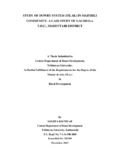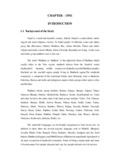Please use this identifier to cite or link to this item:
https://elibrary.tucl.edu.np/handle/123456789/2179| Title: | Study of Dowry System (Tilak) in Maithili Community: A Case Study of Gaushala V.D.C., Mahottari District |
| Authors: | Rauniyar, Sanjita |
| Keywords: | DOWRY SYSTEM;MAITHILI COMMUNITY;MAHOTTARI;social problems |
| Issue Date: | Dec-2015 |
| Publisher: | Central Department of Rural Development Tribhuvan University, Kathmandu |
| Abstract: | Maithili community is one of the communities who reside in Nepal. ‘Study of dowry system (Tilak) in Maithili community’ is the title of this study which was done in Gaushala VDC of Mahottari District. This study tries to shed light on the kind of problems community has faced due to dowry system. This study’s objectives are to assess the attitude and perception of the dowry system in study area, to analyze the impact of dowry system in socio-cultural, economic and educational sector, to assess the domestic violence in Maithili community because of dowy system, and to account present practice of dowry. This study is mainly passed on primary data. 90 households of Maithili community from 3022 households of Gaushala VDC were selected through non- probability sampling method which comes under purposive sapling method. 6 females from each ward were selected, and remaining six females was selected as key informants. Similarly, 3 males were selected from each ward, and remaining three males was key informants too. While analyzing educational status of study area, 16.67% are illiterate, and 11.11% are educated till secondary level. 38.89% said boy’s occupation is the criteria to choose groom, likewise 33.33% and 27.78% said they choose bride in terms of her beauty and education respectively. %5.56% said cash is the mostly used commodity as a dowry in marriage, and physical material and lands, and jewelry were selected by bot 11.11%. Similarly, 66.66% told that cash were used widely in the past, but in the present 54.44% and 45.56 percent choose cash and non-cash stuff respectively which shows both of them are widely use in present condition. While getting the perception regarding dowry from respondents, 11.11% said it’s a good system, and 88.89% showed negative perception. Academic qualification is the main factor for deciding the amount of dowry in this study area. If the groom is highly educated, then his price is higher. If giving part is not capable of meeting demands on their own then 38.89% told ‘loan’ is a way to fulfill the demand, 32.22% told ‘land as a collateral’, and 16.67% said ‘selling vii lands’. 44.44% said they have to face verbal abuse if they are unable to fulfill the demands. Likewise, 92.22% said education has helped in the rise dowry system, and 7.78% said educated has not effect in anyway in dowry system. There were no respondents who chose ‘daughters should not be taught’, 46.67% said ‘girls should be taught’, but 53.33% said it’s better to give dowry than educate the girls. 42.22% which is the highest percentage of respondents answered ‘cultural effect’ is the main reason behind the dowry system. Boy’s side take dowry to refund their expenses in marriage, and if some money is left out then they save it for future guarantee or occupational use. 41.11% said mother-in-law is more responsible for domestic violence due to dowry, 25.56% said it’s father-in-law, 20% said it’s husband, and 13.33% said it’s others. Similarly, regarding who is more responsible for growing trend of it, 57.78% said ‘demanding side’, and 10% said ‘giving side’, and 20% ‘both of them’. 29.41% chose dowry is extra burden for parents, so it should be eradicated, 24.71% said its useless practice, , 22.35% said its makes females inferior in front of male, and 23.53% said it increases the domestic violence. Hence, this system is a major fence for social development since it has been creating many problems in society. And this study also elaborates this system as a setback for social development. So, law should be made and marriage should be done according to law to reduce the dowry system, or culprit should be ready to face the punishment according to the law |
| URI: | http://elibrary.tucl.edu.np/handle/123456789/2179 |
| Appears in Collections: | Rural Development |
Files in This Item:
| File | Description | Size | Format | |
|---|---|---|---|---|
| cover.pdf | 460.93 kB | Adobe PDF |  View/Open | |
| CHAPTER.pdf | 462.85 kB | Adobe PDF |  View/Open |
Items in DSpace are protected by copyright, with all rights reserved, unless otherwise indicated.
